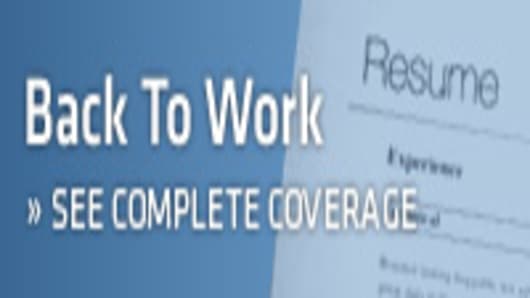With the U.S. unemployment rate at 9.1 percent as of July 31 and a fragile economic recovery underway, many workers feel they are left with no choice but to take their careers into their own hands.
Employees are bidding farewell to corporate America in the hope of finding a more secure, or at least fulfilling, future. They are reinventing themselves by starting their own companies or by pursuing long-put-off dreams that include creative or charitable endeavors.
While it might seem like a bold move, countless workers believe the abundance of uncertainty in today’s job market mitigates the fear factor.
When self-proclaimed "cubicle monkey" Charlie Avallone, a technical writer in the investment field, realized his superior was planning to stick around for at least another 20 years, the 37-year-old from Los Angeles felt he was running out of options.
Underwhelmed by his lateral move choices and faced with a shortage of other opportunities in the marketplace, Avallone decided to opt out. Taking a home equity loan to cover health care and day-to-day living expenses, Avallone started his own consulting business.
"It was very satisfying to leave my job and support myself and be able to think that I was my own boss," says Avallone.
In a challenging economy, the freelancer took on as many assignments as he could handle, often not knowing where his next job would come from. After a three-year “time out,” Avallone was able to re-enter the corporate world at a level above the one he left.
"It was a leap of faith," Avallone says. "But for me it worked out. It’s great knowing that if I had to do it on my own again, I could."
In Search of Balance
Michelle Lawton, who spent two decades in a successful career in branding and marketing, left it all behind to start her own business, Joyful Plate, seeking to strike a better sense of balance in her life.
Lawton decided to use her savings to invest in herself. "I was at a point in my life where I was looking for a real shift," Lawton says. "I realized I had a life opportunity. I had a strong network, and I’ll be 44 this year. This is the time. I wanted to somehow give myself a portal to use my talents to do something that I’m really passionate about. But also, from a strategic standpoint, I wanted to figure out an infrastructure that would allow me to pave my own way moving forward."
Lawton notes when she was in the corporate world working for companies like Procter & Gamble, Pepperidge Farm, Lavazza Coffee and Remy Cointreau, she was compensated very well but still not nearly enough considering the hours she was putting in.
"It’s so hard to find a happy medium," says Lawton. "The stress level is so high, you indulge in unhealthy ways to compensate, emotionally treating yourself, whether it’s overeating or overdrinking or overspending."
As her own boss, Lawton makes time for things she never could during her years in the business world, such as lunchtime yoga and pilates classes.
"It’s something I can’t quantify," explains Lawton. "I’ve never been healthier. What I’m not gaining in financial rewards, I’ve gained in personal well-being. It sounds like a cliché, but it’s a trade-off."
Dr. Kevin Brennan, a New York City-based psychologist who concentrates on helping young professionals, said the pressures of choosing the right career and the right time to follow one’s passions are the centerpiece of his practice.
"This generation's parents said we could do anything we want, just be 'happy,'" says Brennan. "Thus, happiness is now our only benchmark, and it is often the hardest. The previous generation of workers may have also wanted to quit and pursue their passions, but there was an overwhelming expectation to stay put, so there was less anxiety about settling with the dead-end job. 'Happiness' was simply not their primary value, allowing them to settle and put off their passion-hunting until their responsibilities diminished, a.k.a. mid-life crisis."
Two years ago, Brennan saw 10 percent of his patients lose their jobs. "The other 90 percent put economic distress on the top of their weekly dance card," notes Brennan. "Some are looking for promotions in a dry well. Everyone—except the recently unemployed—is feeling the vice tighten at work through increased hours and responsibilities due to a job market into which bosses know employees won't dare venture."
Brennan encourages those who are confused about their careers to think not only outside the box, but outside themselves.
"When in doubt, help others out," advises Brennan. "Ask 10 people who engage in activities that help the world if they love what they do, and nine will say 'absolutely.' If you are bright, capable and bewildered, then why not do something useful for others?"
A man who knows what Brennan’s talking about is 25-year-old Andrew Flavin, who specialized in corporate loan syndication. He and his wife, a recruiter for a hedge fund, turned their backs on careers bringing in over $100,000 annually to build homes for the poor in Tijuana, Mexico, with Amor Ministries. Flavin, whose father is a minister, relished the opportunity to help others ever since he began going on the mission trips with his church as a young boy.
"We had worked at our jobs in New York for about two years when we felt it was time to actually do something that mattered to us for 40-plus hours each week," says Flavin. "Sure, making 70 percent less money made us rearrange our life and the decisions we make, but I would argue those were rearrangements that were long overdue.
"We had to give up weekly sushi. No more cable TV. We couldn't be constantly buying new clothes and shoes, and we actually had to live with a budget. But what was the alternative, to keep living life comfortably yet without passion and with terrible flaws in our priorities?"
For those thinking about starting a new chapter, entrepreneurs offer hard-won insights from their first-hand experiences.
Get Your Finances In Order
"Take a look at what you earn every month in your salary. Figure out in your business plan how you could realistically survive knowing that you may only get a third, or half of that, for a few years," Lawton says. "Make sure you are truly ready and make sure you are not disappointing anyone else."
Both Avallone and Lawton said their decisions were easier to make because neither is married or has children.
Build a Strong Foundation
"Get training or additional education to help support you in your new career," says Meredith Foltynowicz of Hoboken, who went to the Institute of Culinary Education on the weekends to become a pastry chef before leaving a successful job in fashion recruiting. "Not only will this give you credibility in your new field, but it will give you the inner confidence you need as you are getting started."
Find A Mentor
Nik Mody, who spent more than a decade climbing the corporate ladder only to leave to start the travel savings club MHNSaves.com, says, "Seek guidance from seasoned professionals in that niche when developing your concept. Don’t think you know it all, because you don’t, trust me. Form an advisory board or get personal mentors in your business. Leverage the experience of others."
Lawton agreed, "Bounce ideas off people that you trust. You can’t work in a silo," she advised.
Mody also recommends seeking advertising assistance, noting that in most cases entrepreneurs will face stiff competition, making branding that much more important.
Go Solo
Be prepared to be a one-man show for a while, said Lawton, who went from having ample resources to tap into on the corporate side to being completely on her own.
"You might be doing everything for yourself for a while. You have to be nimble and sometimes make decisions quickly. Trust your gut," she says. "Try, while you have your job, to get your concept really clear. Try early on to get a lot of the logistical stuff ready. Contracts and separate bank accounts can take up valuable time once you’re trying to run your new business."
Mody concurs. "Be prepared to give up free time at least in the very beginning. After all, if you are passionate about it, you will want to keep at it forever," he says.
Be Disciplined
Lawton said she is at her desk, albeit one in her home, at 9 a.m. every morning with coffee in hand, dressed and ready to work.
“I absolutely treat this like a 9-5 job,” she says.
Have An Exit Strategy
"Know your backup plan," says Mody. "When all else doesn’t work out, you will need to know your next chapter in life."
For those ready to roll the dice, a question to consider: Do the rewards of freedom, autonomy and the chance for personal happiness outweigh those of following the traditional path?




